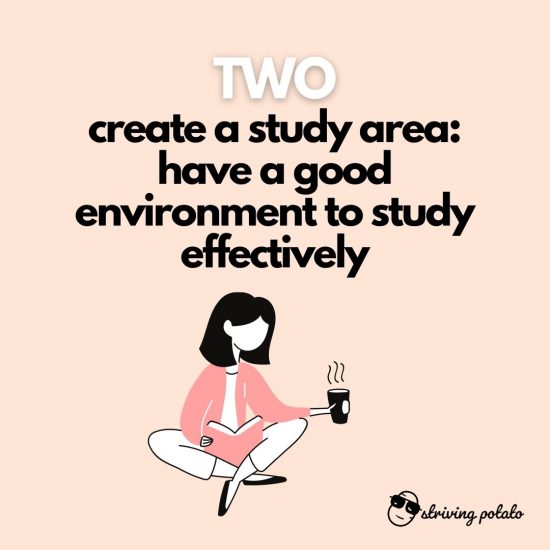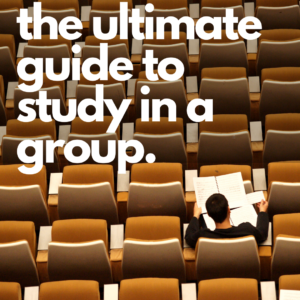
If you search for study tips or how to study effectively on Youtube you will probably come across a lecture from the 2011 title study less, study smart by Professor Marty Lobdell. I did the same thing a few years back. The only issue is the lecture is almost an hour long. So, I have summarized the key info taken from the lecture.
Let’s dive right into it.
Table of Contents
Toggle1. Break your study time: Study long hours is not effective

This advice is quite straight forward but often, students lose sight of it: Break your study time.
Imagine if you want to study for 3 hours after the class, your efficiency in studying might decrease over time
Now, if you take a 5-minute break after every 25 minutes you study, you can maintain and improve your study efficiency for a longer period.
Tip: Study on periods of 25 -30 min and then go away and do whatever enjoyable thing you want for 5 minutes.
Look for a break that works. It can be as simple as talking to your friends or parents, going for a quick snack break, or just doing deep breathing exercises. Whatever you think you want to do in a short 5 minutes.
I personally recommend not using your phone or checking your social media during this short break. Most of the time we tend to overspend the time using the phone. And it’s quite difficult to shift our focus back into studying after we look at the Instagram that our friend is out there having fun. The short break is necessary, but what we do during that break is a very important aspect that needs not be overlooked.
“The short break is necessary, but what we do during that break is a very important aspect that needs not be overlooked.”
By introducing a short break in your study session, you manage to improve the efficiency of your study session. And there are higher chances that whatever you are studying will be understood better compared to forcing yourself to study longer hours without any break.
Once you are done, let say study for 3 hours with a 15-minute break, you can go and give yourself a big reward afterwards. Maybe you can go and play video games for 3o minutes or spend time with your family. Any good rewards that make you feel fulfilling.
“Thing that gets reinforced, we can do more, things that are punished or ignored we tend to do less of, and we operate greatly using this principle.”
When you push yourself to study long hours without taking any break, you associate a negative emotion when you study. This makes you feel studying is a burden and start ignoring and avoiding it as much as possible. The outcome? Flunking your exam.
Tip: When I start writing my PhD thesis, I used the Pomodoro technique to help me focus during the writing process. I spend 45 min writing and give myself 5-10 minute break. The self-made rule I did before is not to use my phone during my short break. The outcome is pretty good. I manage to write my thesis within 2-3 months.
2. Create a study area: Have a good environment to study effectively

In the lecture, Prof Marty Lobdell share an experiment conducted where the researcher ask the student what is the biggest issue they faced when it comes to studying.
They answer “they can’t get into it”.
What they found out is that majority of the student is staying in the dorm where they groom, sleep, socialize in the same room. So they asked the student to have a study lamp. Place the lamp on their desk opposite the bed and switch it on ONLY when they want to study and off when they want to do other things.
The result they get during the final exam is quite remarkable. The students with the study lamp get 1-grade point higher compared to the control group, which didn’t do anything.
The study lamp works by associating the environment with productivity, studying, and working.
If you are fortunate enough to have your study room, that’s good. But, if you don’t have anything like that, use your university library or other shared spaced area where you can focus and study.
My friend has quite the same concept with the study lamp. But she using her study pen. Whenever she takes out the pen, she said it’s time to get serious and study.
During the lockdown, I found that many students complain that they were unable to focus when they study. When I asked them in detail, most of them informed me that they did their study at the dining table. It is difficult to focus and be productive in an area that is designed to be socialising and eating.
Find the environment that works for you. Design your own space and start studying
3. The more active you are in your learning the more effective it will be

Another misconception faced by the majority of the student is studying is equal to reading the textbook repeatedly.
First, we need to decide the difference between Facts and Concepts (Facts vs Concepts)
“Facts are straightforward information whereas the concept is the generalized idea of that information.”
Eg: The fact: name of the bone and muscle in the upper limb. The concept is the functionality aspect of the bone and muscle.
The concepts need to be understood first and once you understood them, try to explain them in your own words.
Prof Lobdell did an exercise with his students where he divide the class into 2 groups. The first group is given 13 lists of animals and they are requested to estimate the presence of the vowel in the spelling of the animal. In the second group, they need to think about which animal they think is beneficial to bring to the deserted island. Meaning, they need to think about the value of each animal and that requires deeper processing.
They found that the second group was able to remember twice as much compared to the first group.
The result shows that the more you understand the concept the better. The information becomes more meaningful as you try to relate the new information with other pieces of information that you already know.
You can imagine it like the filing system. Every time you read and understand certain information that is related to the existing knowledge, you will keep it in the same file.
If it’s totally brand new information, it will take some time to create a new filing system as you still need time to understand it. So, it’s okay if you spend more time understanding that new lecture given if it’s the first concept that needed to be understood.
How to be active in learning?
a) Create a study group
If you’re teaching and you don’t remember something or are unable to give a good explanation, you are able to identify the gaps of information. So you just need to visit again the topic or have your lecturer explain to you the concept once again.
If you don’t have anyone next to you, teach an empty chair or your pet. There is nothing wrong with speaking out loud to nobody if you realize what you are doing. You can create a dialogue with an imaginary friend who asks questions and you have to answer those. Maybe you can write instead of talking if you prefer.
Go to your classmate or see the lecturer and ask the question
The best way to learn is recitation. To be specific, active recitation. Teach to someone else. Talking out loud.
Write it out if you like. Research said that when studying we need to spend 20% reading and the other 80% recitation.
b) Highlight the book
Sometimes, when we highlighted that information in the book, we thought that we have to study as we somehow know the sentence from the paragraph we just highlight. That is why it’s important to know the difference between recognition and recollection.
Our brains are extremely good at “remembering” things (only recognizing) when we read again a passage. After some time, we will completely forget about it. The reason why we forget about it is because of lacking connecting the information with an idea that is exist before. In other to understand, we need to recollect old information and link it with the new one.
To make it active learning, question yourself about the information you just highlighted. Why did you highlight it? Is it important for you? If important, why? Explain to yourself after you highlight the sentence or paragraph to make it more active
c) Taking notes
Right after class, take 5-10 minutes to go through your notes and expand the note if needed. Try to explain to yourself or your friend briefly about the topic. Understand the topic deeper by explaining it using your own words. You might forget once you reach home, so this powerful addition of 5-10 min per class will give you the extra boost of understanding.
Tip: Sleep better to do better. Consolidation of memory occurs during deep sleep.
4. Know how to read the textbook (SQ3R)

The survey, question, read, recite, review…
Survey: Skim the chapter that you are about to study. Look at the topic, the subtopic, the picture, the graph. Just go through it. You don’t have to engage or read in detail first, Just skim through like how you flip the magazine. Look what is the chapter or topic trying to tell you. Roughly gauge what is the must-know information from the chapter. Make a mental note of what you think is important and work as the pillar of the topic.
Tip: Usually the flowchart present in the textbook presents important information from the chapter. So make sure you take note of it.
Question: As you skim through the book, look at the picture and the paragraph and ask questions to yourself. Why the graph is like this? Why does the paragraph mention that? Look at the question at the end of the chapter and identify the concentration in which area. This will give you a rough idea of where to focus when you read. You can write the question on a piece of paper or use a google document.
Read, recite, review: This personally I think goes hand in hand together. There is no specific sequence on how to do it. As you read, try to explain the question you prepare just now.
Use the sticky note to make notes and highlight important keywords. For me, I will create a flowchart and draw a small mind map related to the information I understand from the textbook
Tips: Prepare some questions in the google spreadsheet with the answer. That way, you can use the same question for revision later. Hide the answer column and work the way down to explain the answer during the review or revision session.
5. Memorize facts

Mnemonics: acronyms, coined phrases, interactive images
Certain information works best with mnemonics. You can be creative and do your own acronym or interactive images
I personally don’t use this part as much because I tend to forget the acronym and just remember the funny words. But I know that certain students work well with using mnemonics to memorize facts
Now, I would like to hear from you.
What is the best tip that you like from Prof Lobdell lecture? And what is your favourite study tip that works best for you.
Comment and share with me your thought.



